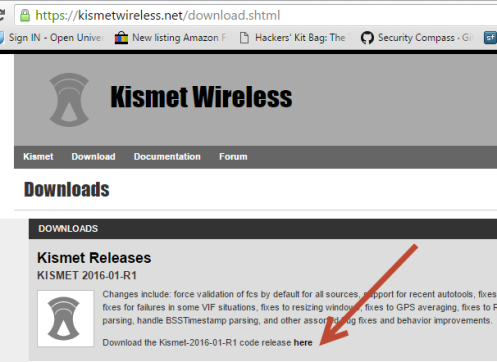Step One:
Kismet is a Wifi-hacking tool used to find and identify wireless devices. The word in Arabic means ‘division’. On a lighter note, Kismet, in the Indian national language Hindi, is often used when something of importance comes into your life entirely by chance or by fate.
1.1 Download Cygwin setup from
Kismet: Kismet is a WIFI network analysis tool. This is the 802.11 second layer wireless network detector, sniffer and intrusion detection system. It applies to wireless network cards that support original monitoring (rfmon) mode and can intercept 802.11a / b / g / n traffic. It collects data packets and identifies the network by hiding the. Free Facebook Wi-Fi. Kismet Wi-Fi password cracker software. Kismet is a network detector, packet sniffer, and intrusion-detecting software for 802.11 wireless LANs that support raw monitoring mode and sniff 802.11a, 802.11b, 802.11g, and 802.11n traffic.
Cygwin.com and start the installer.1.2 Follow the instructions and install the default system. Warning: This can end up taking of a couple gig on your drive. Feel free to figure out what isn't needed and let me know.
1.3 Under Development, add the following packages to be installed:
gcc
libtool
make
Under libs, add the following:
libncures
libncurses-devel
Under Utils, add the following:
patch
patch-utils
tzcode time
1.4 Let the installer do it's thing until Cygwin is installed
1.5 Start Cygwin and once you get a prompt type the following to setup cygwin so the compiler can see your local windows users:
mkpasswd -l > /etc/passwd
mkgroup -l > /etc/group
Step Two:
2.1 Download the GPSD 2.30 tarball
2.2 Untar the GPSD tarball with the following:

tar -zxvf gpsd-2.30.tar.gz
then copy the cygwin-2.diff file into the newly created gpsd-2.30 directory

cp cygwin-2.diff gpsd-2.30
2.3 Now we need to patch the GPSD source so that Cygwin can compile. Switch into the gpsd directory and patch the source:
cd gpsd-2.30
patch <>
You should see the following, if you don't try again from the beginning:
patching file configure
patching file gpsd.h
patching file serial.c
patching file sirfmon.c
Now we can start compiling GPSD with:
./configure
make
make install
Provided you have installed all the packages nessecary, GPSD should compile with a minimal amount of complaining.
Step Three:
3.1 Depending on your GPS reciever, there may be some changes nessecary to running GPSD. However with my limited testing, I've found you should be able to get by with just the following:
Kismet Download Free
./gpsd /dev/comX
Where 'X' is the number of the com port your reciever is hooked up to (com1, com2, etc).
3.2 Provided your reciever is outputting NMEA sentences and has a fix, you can test GPSD quickly through telnet:
telnet localhost 2947
Once connected, type 'r' for raw mode

You should be seeing GPS NMEA strings go flying by. If you don't, double check your reciever and port.
Step Four:
Kismet Windows 10
Provided GPSD is reading the strings, there should be no major changes required to Kismet to get it to work. Just make sure that the kismet.conf file is setup to use a GPS (it is by default), and make sure GPSD is running before you start Kismet and you should see the coordinates on the screen